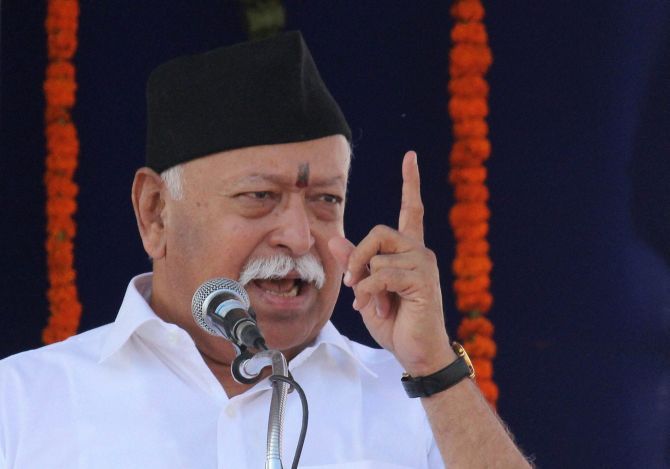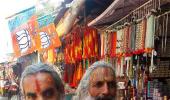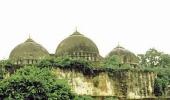
Rashtriya Swayamsevak Sangh chief Mohan Bhagwat on Friday made a strong pitch for building the Ram Temple on the disputed site at Ayodhya, saying only the mandir would come up there and not any other structure.
Addressing the “Dharma Sansad”, a congregation of 2,000 Hindu saints, mutt heads and Vishwa Hindu Parishad leaders from across the country at Udupi, he said there should be no ambiguity that Ram Temple will be built at Ayodhya.
“We will construct it. It is not a populist declaration but a matter of our faith. It will not change,” Bhagwat said.
The RSS chief said that after years of efforts and sacrifice, it (building the Ram temple) seemed possible now, while also noting that the matter was in the court.
“Ram Mandir only will be constructed and nothing else. It will be constructed there only” (what is believed to be the birthplace of Lord Ram), Bhagwat said.
He said the temple would be constructed in the same grandeur as it existed before, using the “same stones” under the guidance of those who were the flag-bearers of the Ram Janmabhoomi movement for the last 25 years.
But prior to it (building the temple), public awareness was essential, he said. “We are close to achieving our goal but at this juncture, we should be extra cautious."
"We are close to achieving our goal but at this juncture, we should be extra cautious," he said.
Construction of the Ram temple, prevention of religious conversions and cow protection are among the key issues to be discussed at VHP's three-day 'Dharma Sansad'.
The meet will also discuss issues of discrimination on the basis of caste and gender and explore ways to ensure harmony within Hindu society, the organisers said.
The RSS chief also said the seers and Hindus gathered in huge numbers at the meet need to ponder over the conducive atmosphere prevailing in the country and elsewhere.
He cautioned the people against the forces which divide the society and asked them to remain alert.
The RSS supremo also spoke about religious conversion and the need to reach out to those who are prone to it.
"The strength of the society lies in its unity. When it is destroyed, anti-national forces gain foothold. We need to understand the consequences of religious conversion. We need to reach out to those who are prone to conversion," Bhagwat said.
He reminded the meet about the duty of seers and members of upper caste towards Dalits and other backward communities.
"The need for equality is still elusive in our deeds and practises though we all understand its significance."
"We should rise above the barriers of caste, creed and religion in our speech and action while treating people and embrace everybody wholeheartedly. There should not be any discrimination on the issues of sharing water, religious places and cremation grounds," said Bhagwat.
On cow-vigilantism, Bhagwat said people know what happens to the cows when they are sold to butchers.
He said 'cow protectors' surface due to the callousness of society.
"Society is careless about the status of cows. Those who have concern for the cows stand up to protect the cattle. This leads to conflict in the society resulting in bad name to the 'cow protectors'," said Bhagwat.
Vishvesha Teertha Swamiji of Pejavar Math of Udupi, who chairs the reception committee, said the Ram Temple would be built in a year, well before 2019.
The octogenarian seer with a huge following in Karnataka and elsewhere, demanded that the government amend the Constitution to do away with special provisions for minorities in order for equality in the society.
Addressing the meet earlier, VHP leader Pravin Togadia set the tone for the issues to be discussed in the Dharma Sansad in the next three days.
He reiterated VHP's affirmation to build the Ram Temple and a ban on cow slaughter.
Togadia also demanded that the government should not regulate Hindu temples.
"If the Indian Constitution is secular, why are governments regulating Hindu temples? Are there any instances of government controlling any mosque or church? If not, then why is this discrimination only with Hindu temples.
"Let Hindus manage their temples," he said.
Located in the coastal area, Udupi is famous for the Krishna temple with the idol believed to have been discovered by 13th century Vaishnavite saint Madhwacharya, who founded the Dwaitha school of philosophy.
While ochre colour festoons and flags dotted every part of Udupi and neighbouring towns such as Manipal, the attire of the participants and the marquee has filled in the atmosphere with Hindutva flavour.
Elaborate security has been made for the Dharma Sansad.
The Udupi event is significant as the first formal announcement for Ram Temple at Rama Janmabhoomi in Ayodhya was made here in 1985 and a year later, the doors of the Ram Temple in Ayodhya were open to the public for darshan.
'Bhagwat's remarks challenge to SC'
Muslim organisations reacted sharply to RSS chief's strong pitch for building the temple on the disputed site at Ayodhya, terming it as a direct challenge to the apex court before which the matter wass pending, and demanded action against him.
They also alleged that Bhagwat was trying to help the BJP in the upcoming Gujarat elections by diverting the attention of voters from "real" issues with such statements.
"The All India Muslim Personal Law Board has faith in the judiciary and will try to implement its order... by issuing this statement Mohan Bhagwat has taken law into his hands," the spokesman of the AIMPLB, Maulana Khaild Saifullah Rehmani, said.
He demanded that the government take action against "such people who are openly showing disrespect to the courts and taking law into their hands".
Bhagwat has issued "a one-sided statement that only a temple will be constructed at the site and this is unacceptable to us", Rehmani said, adding this amounts to showing disrespect to the court.
The convenor of Babri Masjid Action Committee and member of the Board, Zafaryab Jilani, alleged that such remarks "challenging" the apex court are a threat to democracy.
Jilani, who is also a senior counsel, said that it appears that Bhagwat has tried to help the BJP in the Gujarat assembly elections through his statement.
"Bhagwat has given an open challenge to the Supreme Court .... As per the Constitution, the apex court is supreme and its orders have to be implemented in the country ...it has asked for maintaining status quo on the site ...through this statement Bhagwat has given a direct challenge to the Supreme Court and this is also a threat for democracy," he said.
The spokesman of All India Shia Personal Law Board, Maulana Yasoob Abbas, said "Sangh chief is not above the Supreme Court, he will also have to accept the court verdict".
"Despite the issue pending in the court, Mohan Bhagwat has given this statement only to divert the attention of voters in Gujarat from real issues," Abbas said.
The Supreme Court will on December 5 commence the final hearing on the cross-appeals filed against the 2010 judgement of the Allahabad High Court in the Ram Janmabhoomi-Babri Masjid title dispute.
The high court had ruled a three-way division of the disputed 2.77 acre area at Ayodhya among the parties -- the Sunni Waqf Board, the Nirmohi Akhara and the Ram Lalla.












 © 2025
© 2025